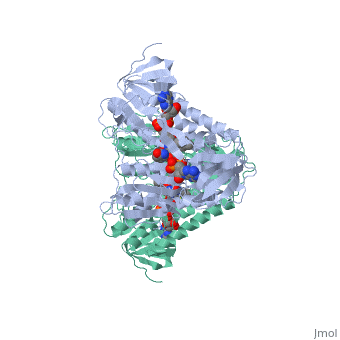Dihydrolipoamide dehydrogenase
From Proteopedia
|
Contents |
General
Dihyrolipoamide dehydrogenase (E3) is a part of the multienzyme complex of pyruvate dehydrogenase. This multienzyme complex catalyzes the formation of Acetyl-CoA from pyruvate via oxidative decarboxylation.
Structure
In E. coli this complex exists as 24 E2 proteins arranged in a cube, surrounded by 12 E1 proteins and 12 E3 proteins. Dihidrolipoamide dehydrogenase (E3) binds to the pyruvate dehydrogenase complex (and the center of the cube of E2 proteins) through a .‘[1]’ The E3 binding protein is a completely separate protein from E3, but serves to connect the E3 polypeptides to the overarching structure. The active site includes an FAD group, as well as forming a disulfide bond. When the substrate is not present, “covers” the catalytic site from being exposed to solvents. Dihidrolipoamide dehydrogenase (E3) is a SCOP alpha and beta (a/b) class protein of the FAD/NAD(P)-binding domain fold.
Mechanism
The redox reaction occurs through the influence of , between which there is a disulfide bond within a distorted alpha helix. This redox active disulfide bond becomes reduced in order to reoxidize the E2 enzyme of the multienzyme complex.‘[2]’ E2 donates protons and electrons to E3 in order to complete its catalytic cycle. The E3 enzyme’s flavin ring (FAD) funnels electrons from the disulfide bond to itself, , reoxidizing the E3, and leaving it ready for the beginning of its catalytic cycle again.
Regulation
The regulation of Dihidrolipoamide dehydrogenase (E3) kinetically comes through regulation of the entire Pyruvate Dehydrogenase complex. As would be expected, one of the main regulators is the presence of its product, acetyl-CoA as well as NADH. This is through the E1 reaction of the complex, but necessarily effects the E3 reaction. However, the E1 portion of the complex is also regulated by phosphatase and kinase in phosphorylation and dephosphorylation reactions.‘[3]’
3D structures of dihydrolipoamide dehydrogenase
3ic9 – DLD – Colwellia psychrerythraea
2qae – DLD – Trypanosoma cruzi
2ihw – bDLD E2 - bovine
2eq6 – TtDLD – Thermus thermophilus
2yqu – TtDLD E3
2eq7, 2eq8, 2eq9 – TtDLD E2+E3
1ivi – DLD – pig
1jeh – yDLD E3 – yeast
1dxl – DLD – pea
1lpf – DLD – Pseudomonas fluorescens
3lad – DLD – Azotobacter vinelandii
3l60 – MtDLD E2 – Mycobacterium tuberculosis
2a8x - MtDLD E3
DLD binary complexes
2ii3, 2ii4, 2ii5 – bDLD + CoA
3rnm – hDLD subunit-binding domain + dihydrolipoyl dehydrogenase – human
2f5z, 1zy8 – hDLD E3 + pyruvate dehydrogenase E3-binding domain
1zmc, 1zmd – hDLD + NAD
1v59 – yDLD + NAD
1lvl – DLD + NAD – Pseudomonas putida
3ii4 – MtDLD + inhibitor
1ebd – DLD + dihydrolipoamide acetyltransferase binding domain – Geobacillus stearothermophilus
- ↑ Brautigam CA, Wynn RM, Chuang JL, Machius M, Tomchick DR, Chuang DT. Structural insight into interactions between dihydrolipoamide dehydrogenase (E3) and E3 binding protein of human pyruvate dehydrogenase complex. Structure. 2006 Mar;14(3):611-21. Epub 2006 Jan 26. PMID:16442803 doi:10.1016/j.str.2006.01.001
- ↑ Voet, Donald et al. 2008. Fundamentals of Biochemistry. 3rd ed. pp.570-575
- ↑ Voet, Donald et al. 2008. Fundamentals of Biochemistry. 3rd ed. p.585
Proteopedia Page Contributors and Editors (what is this?)
Michal Harel, Nicholas Rockefeller, Alexander Berchansky, David Canner, Shane Michael Evans, Jaime Prilusky

